外研版八年级英语下册Module 9 Friendship 教案
- 格式:doc
- 大小:29.31 KB
- 文档页数:8
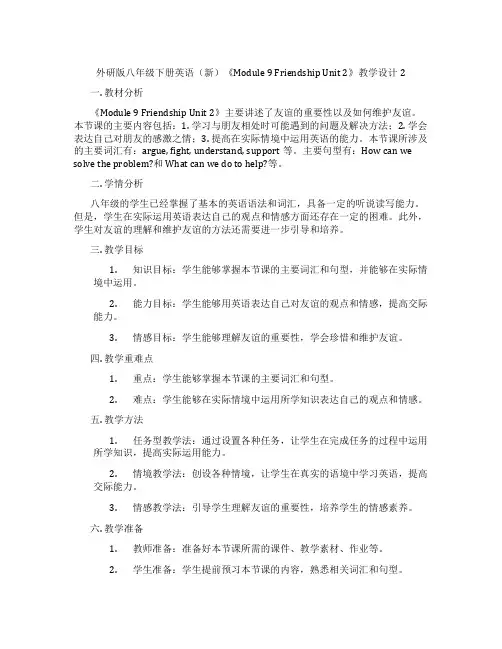
外研版八年级下册英语(新)《Module 9 Friendship Unit 2》教学设计2一. 教材分析《Module 9 Friendship Unit 2》主要讲述了友谊的重要性以及如何维护友谊。
本节课的主要内容包括:1. 学习与朋友相处时可能遇到的问题及解决方法;2. 学会表达自己对朋友的感激之情;3. 提高在实际情境中运用英语的能力。
本节课所涉及的主要词汇有:argue, fight, understand, support等。
主要句型有:How can we solve the problem?和What can we do to help?等。
二. 学情分析八年级的学生已经掌握了基本的英语语法和词汇,具备一定的听说读写能力。
但是,学生在实际运用英语表达自己的观点和情感方面还存在一定的困难。
此外,学生对友谊的理解和维护友谊的方法还需要进一步引导和培养。
三. 教学目标1.知识目标:学生能够掌握本节课的主要词汇和句型,并能够在实际情境中运用。
2.能力目标:学生能够用英语表达自己对友谊的观点和情感,提高交际能力。
3.情感目标:学生能够理解友谊的重要性,学会珍惜和维护友谊。
四. 教学重难点1.重点:学生能够掌握本节课的主要词汇和句型。
2.难点:学生能够在实际情境中运用所学知识表达自己的观点和情感。
五. 教学方法1.任务型教学法:通过设置各种任务,让学生在完成任务的过程中运用所学知识,提高实际运用能力。
2.情境教学法:创设各种情境,让学生在真实的语境中学习英语,提高交际能力。
3.情感教学法:引导学生理解友谊的重要性,培养学生的情感素养。
六. 教学准备1.教师准备:准备好本节课所需的课件、教学素材、作业等。
2.学生准备:学生提前预习本节课的内容,熟悉相关词汇和句型。
七. 教学过程1.导入(5分钟)教师通过向学生提问:“What’s the most important thing in your life?”引导学生思考友谊的重要性,从而引出本节课的主题。
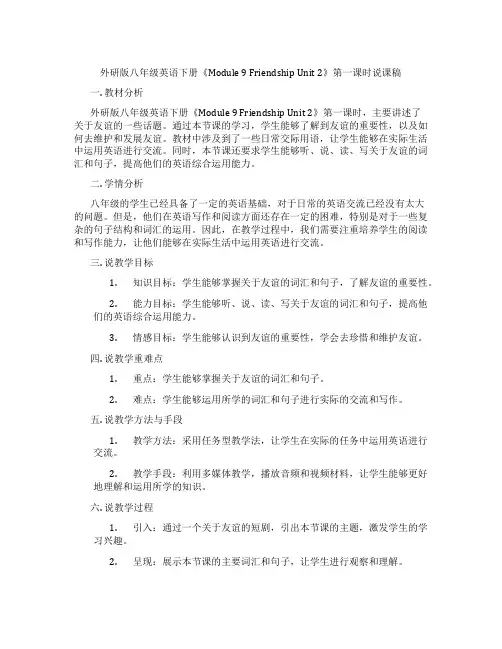
外研版八年级英语下册《Module 9 Friendship Unit 2》第一课时说课稿一. 教材分析外研版八年级英语下册《Module 9 Friendship Unit 2》第一课时,主要讲述了关于友谊的一些话题。
通过本节课的学习,学生能够了解到友谊的重要性,以及如何去维护和发展友谊。
教材中涉及到了一些日常交际用语,让学生能够在实际生活中运用英语进行交流。
同时,本节课还要求学生能够听、说、读、写关于友谊的词汇和句子,提高他们的英语综合运用能力。
二. 学情分析八年级的学生已经具备了一定的英语基础,对于日常的英语交流已经没有太大的问题。
但是,他们在英语写作和阅读方面还存在一定的困难,特别是对于一些复杂的句子结构和词汇的运用。
因此,在教学过程中,我们需要注重培养学生的阅读和写作能力,让他们能够在实际生活中运用英语进行交流。
三. 说教学目标1.知识目标:学生能够掌握关于友谊的词汇和句子,了解友谊的重要性。
2.能力目标:学生能够听、说、读、写关于友谊的词汇和句子,提高他们的英语综合运用能力。
3.情感目标:学生能够认识到友谊的重要性,学会去珍惜和维护友谊。
四. 说教学重难点1.重点:学生能够掌握关于友谊的词汇和句子。
2.难点:学生能够运用所学的词汇和句子进行实际的交流和写作。
五. 说教学方法与手段1.教学方法:采用任务型教学法,让学生在实际的任务中运用英语进行交流。
2.教学手段:利用多媒体教学,播放音频和视频材料,让学生能够更好地理解和运用所学的知识。
六. 说教学过程1.引入:通过一个关于友谊的短剧,引出本节课的主题,激发学生的学习兴趣。
2.呈现:展示本节课的主要词汇和句子,让学生进行观察和理解。
3.操练:通过一些小组活动,让学生在实际的语言环境中进行交流和运用。
4.练习:通过一些听力、口语、阅读和写作的练习,让学生巩固所学的知识。
5.巩固:通过一些游戏和活动,让学生在轻松的氛围中复习和巩固所学的知识。
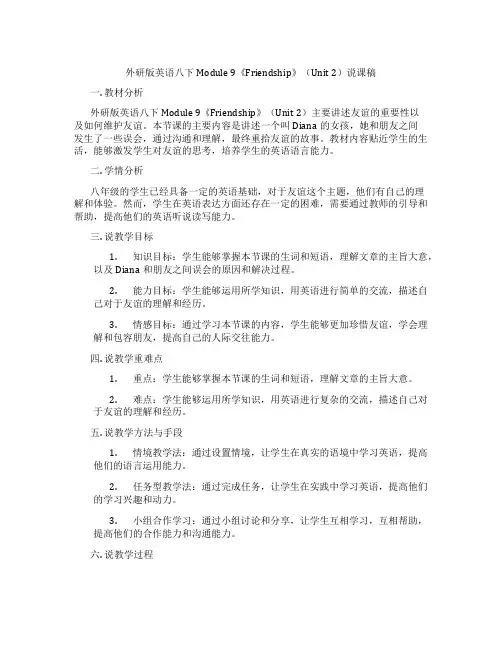
外研版英语八下Module 9《Friendship》(Unit 2)说课稿一. 教材分析外研版英语八下Module 9《Friendship》(Unit 2)主要讲述友谊的重要性以及如何维护友谊。
本节课的主要内容是讲述一个叫Diana的女孩,她和朋友之间发生了一些误会,通过沟通和理解,最终重拾友谊的故事。
教材内容贴近学生的生活,能够激发学生对友谊的思考,培养学生的英语语言能力。
二. 学情分析八年级的学生已经具备一定的英语基础,对于友谊这个主题,他们有自己的理解和体验。
然而,学生在英语表达方面还存在一定的困难,需要通过教师的引导和帮助,提高他们的英语听说读写能力。
三. 说教学目标1.知识目标:学生能够掌握本节课的生词和短语,理解文章的主旨大意,以及Diana和朋友之间误会的原因和解决过程。
2.能力目标:学生能够运用所学知识,用英语进行简单的交流,描述自己对于友谊的理解和经历。
3.情感目标:通过学习本节课的内容,学生能够更加珍惜友谊,学会理解和包容朋友,提高自己的人际交往能力。
四. 说教学重难点1.重点:学生能够掌握本节课的生词和短语,理解文章的主旨大意。
2.难点:学生能够运用所学知识,用英语进行复杂的交流,描述自己对于友谊的理解和经历。
五. 说教学方法与手段1.情境教学法:通过设置情境,让学生在真实的语境中学习英语,提高他们的语言运用能力。
2.任务型教学法:通过完成任务,让学生在实践中学习英语,提高他们的学习兴趣和动力。
3.小组合作学习:通过小组讨论和分享,让学生互相学习,互相帮助,提高他们的合作能力和沟通能力。
六. 说教学过程1.导入:教师通过提问方式引导学生谈论友谊的重要性,激发学生的学习兴趣。
2.呈现:教师通过展示文章图片,引导学生预测文章内容,激发学生的学习好奇心。
3.阅读:教师引导学生阅读文章,回答相关问题,帮助学生理解文章的主旨大意。
4.听力:教师播放听力材料,学生完成相关练习,提高学生的听力能力。
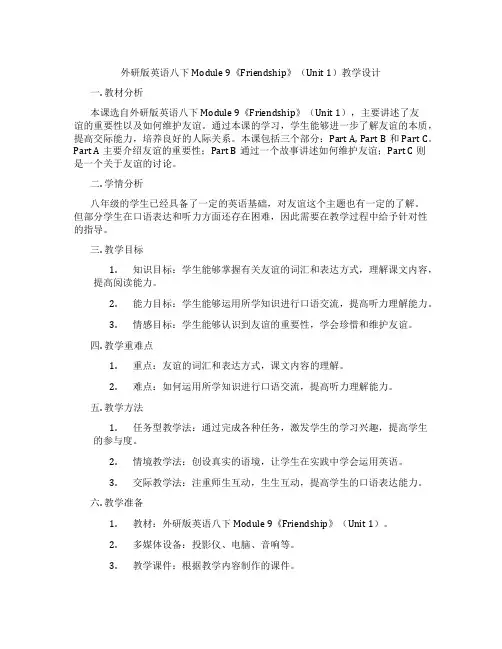
外研版英语八下Module 9《Friendship》(Unit 1)教学设计一. 教材分析本课选自外研版英语八下Module 9《Friendship》(Unit 1),主要讲述了友谊的重要性以及如何维护友谊。
通过本课的学习,学生能够进一步了解友谊的本质,提高交际能力,培养良好的人际关系。
本课包括三个部分:Part A, Part B和Part C。
Part A主要介绍友谊的重要性;Part B通过一个故事讲述如何维护友谊;Part C则是一个关于友谊的讨论。
二. 学情分析八年级的学生已经具备了一定的英语基础,对友谊这个主题也有一定的了解。
但部分学生在口语表达和听力方面还存在困难,因此需要在教学过程中给予针对性的指导。
三. 教学目标1.知识目标:学生能够掌握有关友谊的词汇和表达方式,理解课文内容,提高阅读能力。
2.能力目标:学生能够运用所学知识进行口语交流,提高听力理解能力。
3.情感目标:学生能够认识到友谊的重要性,学会珍惜和维护友谊。
四. 教学重难点1.重点:友谊的词汇和表达方式,课文内容的理解。
2.难点:如何运用所学知识进行口语交流,提高听力理解能力。
五. 教学方法1.任务型教学法:通过完成各种任务,激发学生的学习兴趣,提高学生的参与度。
2.情境教学法:创设真实的语境,让学生在实践中学会运用英语。
3.交际教学法:注重师生互动,生生互动,提高学生的口语表达能力。
六. 教学准备1.教材:外研版英语八下Module 9《Friendship》(Unit 1)。
2.多媒体设备:投影仪、电脑、音响等。
3.教学课件:根据教学内容制作的课件。
4.学习资料:相关友谊的图片、文章等。
七. 教学过程1.导入(5分钟)利用多媒体展示一些关于友谊的图片,引导学生谈论友谊的重要性。
教师提问:“What is friendship? Why is it important?”,让学生发表自己的看法。
2.呈现(10分钟)教师播放课文录音,让学生跟随录音朗读。
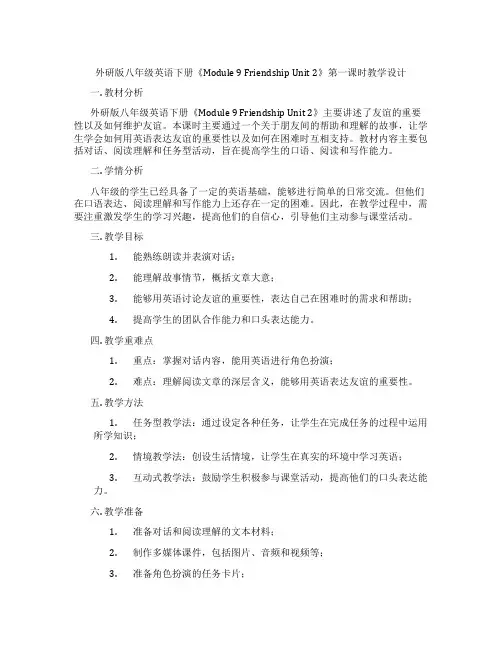
外研版八年级英语下册《Module 9 Friendship Unit 2》第一课时教学设计一. 教材分析外研版八年级英语下册《Module 9 Friendship Unit 2》主要讲述了友谊的重要性以及如何维护友谊。
本课时主要通过一个关于朋友间的帮助和理解的故事,让学生学会如何用英语表达友谊的重要性以及如何在困难时互相支持。
教材内容主要包括对话、阅读理解和任务型活动,旨在提高学生的口语、阅读和写作能力。
二. 学情分析八年级的学生已经具备了一定的英语基础,能够进行简单的日常交流。
但他们在口语表达、阅读理解和写作能力上还存在一定的困难。
因此,在教学过程中,需要注重激发学生的学习兴趣,提高他们的自信心,引导他们主动参与课堂活动。
三. 教学目标1.能熟练朗读并表演对话;2.能理解故事情节,概括文章大意;3.能够用英语讨论友谊的重要性,表达自己在困难时的需求和帮助;4.提高学生的团队合作能力和口头表达能力。
四. 教学重难点1.重点:掌握对话内容,能用英语进行角色扮演;2.难点:理解阅读文章的深层含义,能够用英语表达友谊的重要性。
五. 教学方法1.任务型教学法:通过设定各种任务,让学生在完成任务的过程中运用所学知识;2.情境教学法:创设生活情境,让学生在真实的环境中学习英语;3.互动式教学法:鼓励学生积极参与课堂活动,提高他们的口头表达能力。
六. 教学准备1.准备对话和阅读理解的文本材料;2.制作多媒体课件,包括图片、音频和视频等;3.准备角色扮演的任务卡片;4.准备相关话题的讨论问题。
七. 教学过程1.导入(5分钟)通过展示一张友谊的图片,引导学生谈论他们的好朋友,分享友谊的故事,激发学生的学习兴趣。
2.呈现(10分钟)向学生介绍本节课的主要内容:一个关于朋友间的帮助和理解的故事。
呈现对话和阅读理解的文本材料,让学生初步感知友谊的重要性。
3.操练(10分钟)将学生分成小组,让他们根据对话内容进行角色扮演。

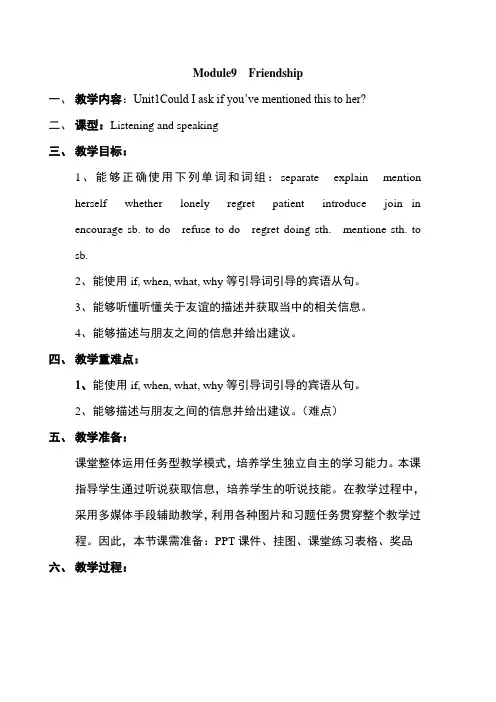
Module9 Friendship一、教学内容:Unit1Could I ask if you’ve mentioned this to her?二、课型:Listening and speaking三、教学目标:1、能够正确使用下列单词和词组:separate explain mentionherself whether lonely regret patient introduce join in encourage sb. to do refuse to do regret doing sth. mentione sth. to sb.2、能使用if, when, what, why等引导词引导的宾语从句。
3、能够听懂听懂关于友谊的描述并获取当中的相关信息。
4、能够描述与朋友之间的信息并给出建议。
四、教学重难点:1、能使用if, when, what, why等引导词引导的宾语从句。
2、能够描述与朋友之间的信息并给出建议。
(难点)五、教学准备:课堂整体运用任务型教学模式,培养学生独立自主的学习能力。
本课指导学生通过听说获取信息,培养学生的听说技能。
在教学过程中,采用多媒体手段辅助教学,利用各种图片和习题任务贯穿整个教学过程。
因此,本节课需准备:PPT课件、挂图、课堂练习表格、奖品六、教学过程:七、板书设计:Module 9 FriendshipUnit1. Could I ask if you’ve mentioned this to her?1) Could I ask if you’ve mentioned this to her?mention sth. to sb. Don’t mention this matter to the others. 2) we got separated when we went to …get \ be separated3) feel \ be sure of onese lf…有信心,自信He often feels sure of himself.4)regret doing sth. 后悔做了…regret to do sth. 对要去做的事情感到遗憾5)be patient with sb.My mum is always patient with me.6) Try to find out whether she feels lonely without you. ( whether…or not \ if…)7) Read the dialogue and find out the Object Clause in the dialogue.8)Find out the expressions when you make a phone call.达标训练题一.翻译下列短语:1. 友情热线______________2.分开________________________________3. 保持联系_______________4. 向某人提及某事_____________________5. 拒绝做某事_____________6. 自信______________________________7. 对……有耐心___________ 8. 后悔做了某事_______________________9. 和…..交朋友____________ 10. 鼓励某人做某事____________________二、翻译句子。
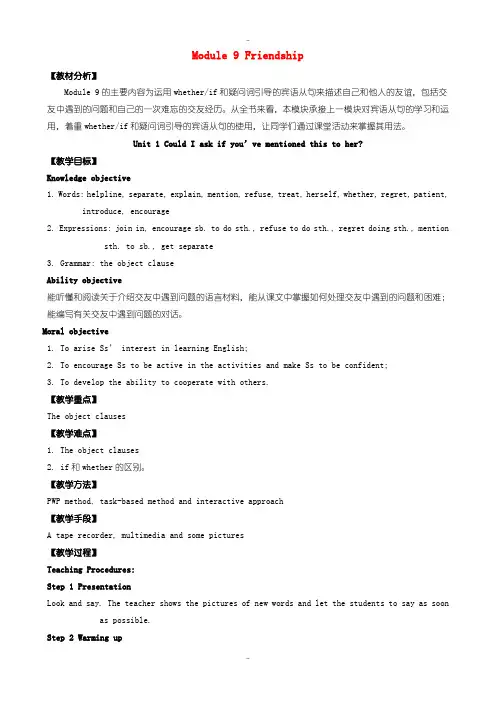
Module 9 Friendship【教材分析】Module 9的主要内容为运用whether/if和疑问词引导的宾语从句来描述自己和他人的友谊,包括交友中遇到的问题和自己的一次难忘的交友经历。
从全书来看,本模块承接上一模块对宾语从句的学习和运用,着重whether/if和疑问词引导的宾语从句的使用,让同学们通过课堂活动来掌握其用法。
Unit 1 Could I ask if you’ve mentioned this to her?【教学目标】Knowledge objective1. Words: helpline, separate, explain, mention, refuse, treat, herself, whether, regret, patient,introduce, encourage2. Expressions: join in, encourage sb. to do sth., refuse to do sth., regret doing sth., mentionsth. to sb., get separate3. Grammar: the object clauseAbility objective能听懂和阅读关于介绍交友中遇到问题的语言材料,能从课文中掌握如何处理交友中遇到的问题和困难;能编写有关交友中遇到问题的对话。
Moral objective1. To arise Ss’ interest in learning English;2. To encourage Ss to be active in the activities and make Ss to be confident;3. To develop the ability to cooperate with others.【教学重点】The object clauses【教学难点】1. The object clauses2. if和whether的区别。
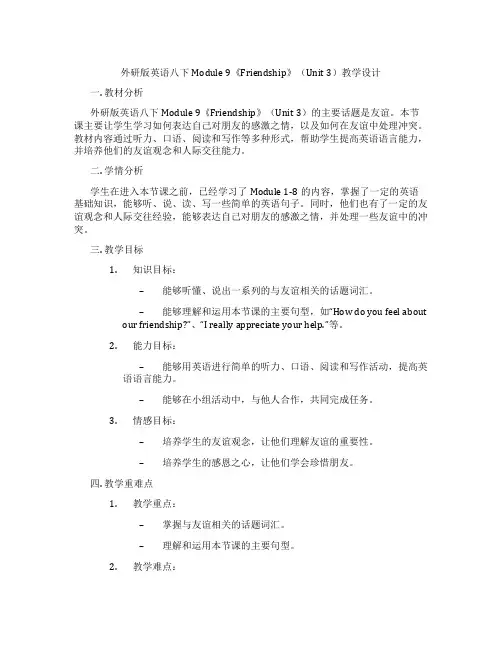
外研版英语八下Module 9《Friendship》(Unit 3)教学设计一. 教材分析外研版英语八下Module 9《Friendship》(Unit 3)的主要话题是友谊。
本节课主要让学生学习如何表达自己对朋友的感激之情,以及如何在友谊中处理冲突。
教材内容通过听力、口语、阅读和写作等多种形式,帮助学生提高英语语言能力,并培养他们的友谊观念和人际交往能力。
二. 学情分析学生在进入本节课之前,已经学习了Module 1-8的内容,掌握了一定的英语基础知识,能够听、说、读、写一些简单的英语句子。
同时,他们也有了一定的友谊观念和人际交往经验,能够表达自己对朋友的感激之情,并处理一些友谊中的冲突。
三. 教学目标1.知识目标:–能够听懂、说出一系列的与友谊相关的话题词汇。
–能够理解和运用本节课的主要句型,如“How do you feel about our friendship?”、“I really appreciate your help.”等。
2.能力目标:–能够用英语进行简单的听力、口语、阅读和写作活动,提高英语语言能力。
–能够在小组活动中,与他人合作,共同完成任务。
3.情感目标:–培养学生的友谊观念,让他们理解友谊的重要性。
–培养学生的感恩之心,让他们学会珍惜朋友。
四. 教学重难点1.教学重点:–掌握与友谊相关的话题词汇。
–理解和运用本节课的主要句型。
2.教学难点:–如何正确表达自己对朋友的感激之情。
–如何处理友谊中的冲突。
五. 教学方法1.任务型教学法:通过各种任务活动,让学生在实际语境中运用英语,提高他们的语言能力。
2.合作学习法:通过小组活动,培养学生的团队合作精神,提高他们的交际能力。
3.情感教学法:通过引导学生思考友谊的重要性,培养他们的友谊观念和感恩之心。
六. 教学准备1.教学材料:教材、多媒体课件、录音机、磁带等。
2.教学环境:教室、多媒体设备等。
3.教学辅助工具:黑板、粉笔、挂图等。
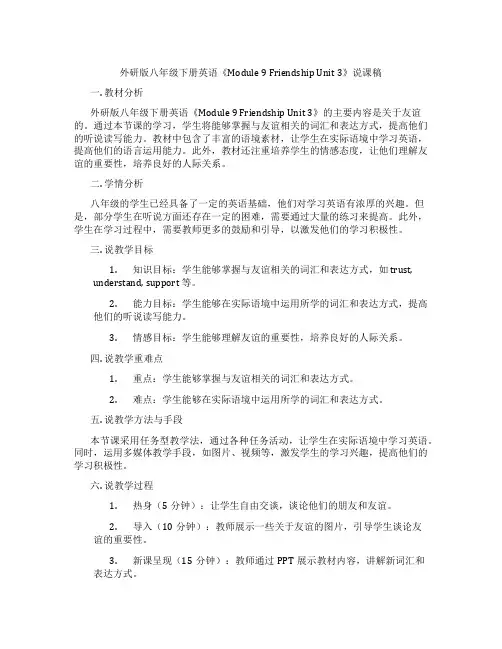
外研版八年级下册英语《Module 9 Friendship Unit 3》说课稿一. 教材分析外研版八年级下册英语《Module 9 Friendship Unit 3》的主要内容是关于友谊的。
通过本节课的学习,学生将能够掌握与友谊相关的词汇和表达方式,提高他们的听说读写能力。
教材中包含了丰富的语境素材,让学生在实际语境中学习英语,提高他们的语言运用能力。
此外,教材还注重培养学生的情感态度,让他们理解友谊的重要性,培养良好的人际关系。
二. 学情分析八年级的学生已经具备了一定的英语基础,他们对学习英语有浓厚的兴趣。
但是,部分学生在听说方面还存在一定的困难,需要通过大量的练习来提高。
此外,学生在学习过程中,需要教师更多的鼓励和引导,以激发他们的学习积极性。
三. 说教学目标1.知识目标:学生能够掌握与友谊相关的词汇和表达方式,如 trust,understand, support 等。
2.能力目标:学生能够在实际语境中运用所学的词汇和表达方式,提高他们的听说读写能力。
3.情感目标:学生能够理解友谊的重要性,培养良好的人际关系。
四. 说教学重难点1.重点:学生能够掌握与友谊相关的词汇和表达方式。
2.难点:学生能够在实际语境中运用所学的词汇和表达方式。
五. 说教学方法与手段本节课采用任务型教学法,通过各种任务活动,让学生在实际语境中学习英语。
同时,运用多媒体教学手段,如图片、视频等,激发学生的学习兴趣,提高他们的学习积极性。
六. 说教学过程1.热身(5分钟):让学生自由交谈,谈论他们的朋友和友谊。
2.导入(10分钟):教师展示一些关于友谊的图片,引导学生谈论友谊的重要性。
3.新课呈现(15分钟):教师通过PPT展示教材内容,讲解新词汇和表达方式。
4.课堂练习(15分钟):学生进行听力练习,回答与友谊相关的问题。
5.小组讨论(10分钟):学生分小组讨论,分享他们的友谊故事。
6.总结(5分钟):教师总结本节课的主要内容,强调友谊的重要性。
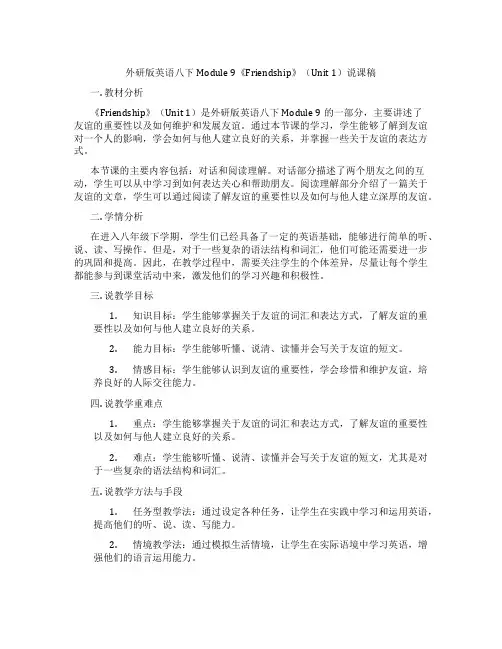
外研版英语八下Module 9《Friendship》(Unit 1)说课稿一. 教材分析《Friendship》(Unit 1)是外研版英语八下Module 9的一部分,主要讲述了友谊的重要性以及如何维护和发展友谊。
通过本节课的学习,学生能够了解到友谊对一个人的影响,学会如何与他人建立良好的关系,并掌握一些关于友谊的表达方式。
本节课的主要内容包括:对话和阅读理解。
对话部分描述了两个朋友之间的互动,学生可以从中学习到如何表达关心和帮助朋友。
阅读理解部分介绍了一篇关于友谊的文章,学生可以通过阅读了解友谊的重要性以及如何与他人建立深厚的友谊。
二. 学情分析在进入八年级下学期,学生们已经具备了一定的英语基础,能够进行简单的听、说、读、写操作。
但是,对于一些复杂的语法结构和词汇,他们可能还需要进一步的巩固和提高。
因此,在教学过程中,需要关注学生的个体差异,尽量让每个学生都能参与到课堂活动中来,激发他们的学习兴趣和积极性。
三. 说教学目标1.知识目标:学生能够掌握关于友谊的词汇和表达方式,了解友谊的重要性以及如何与他人建立良好的关系。
2.能力目标:学生能够听懂、说清、读懂并会写关于友谊的短文。
3.情感目标:学生能够认识到友谊的重要性,学会珍惜和维护友谊,培养良好的人际交往能力。
四. 说教学重难点1.重点:学生能够掌握关于友谊的词汇和表达方式,了解友谊的重要性以及如何与他人建立良好的关系。
2.难点:学生能够听懂、说清、读懂并会写关于友谊的短文,尤其是对于一些复杂的语法结构和词汇。
五. 说教学方法与手段1.任务型教学法:通过设定各种任务,让学生在实践中学习和运用英语,提高他们的听、说、读、写能力。
2.情境教学法:通过模拟生活情境,让学生在实际语境中学习英语,增强他们的语言运用能力。
3.合作学习法:通过小组讨论、同伴互助等方式,让学生相互学习、共同进步。
4.多媒体教学手段:利用多媒体课件、视频等资源,丰富教学内容,激发学生的学习兴趣。
外研版八年级下册英语《Module 9 Friendship Unit 3》教学设计一. 教材分析外研版八年级下册英语《Module 9 Friendship Unit 3》主要围绕友谊这一主题展开。
本节课主要让学生能够掌握有关友谊的词汇和表达方式,能够运用所学的知识谈论自己对友谊的理解和看法。
通过本节课的学习,学生能够提高自己的语言表达能力,增强对友谊的认识和理解。
二. 学情分析学生在之前的学习中已经掌握了有关日常生活的词汇和表达方式,同时也具备了一定的听说读写能力。
但是,对于一些关于友谊的深层次的表达方式和观点可能还比较陌生,需要通过本节课的学习来进一步掌握。
三. 教学目标1.知识目标:学生能够掌握有关友谊的词汇和表达方式,如 trust,understand, share, care 等。
2.能力目标:学生能够运用所学的知识谈论自己对友谊的理解和看法,提高自己的语言表达能力。
3.情感目标:通过本节课的学习,学生能够增强对友谊的认识和理解,更加珍惜自己的朋友。
四. 教学重难点1.重点:学生能够掌握有关友谊的词汇和表达方式。
2.难点:学生能够运用所学的知识谈论自己对友谊的理解和看法。
五. 教学方法1.情境教学法:通过设定情境,让学生在实际情境中运用所学的知识。
2.任务型教学法:通过完成任务,让学生在实践中掌握知识。
3.小组合作学习:通过小组讨论,让学生相互交流,共同提高。
六. 教学准备1.教学PPT:制作相关的教学PPT,展示有关友谊的词汇和表达方式。
2.教学材料:准备一些与友谊相关的故事或文章,用于引导学生进行思考和讨论。
3.教学设备:准备电脑、投影仪等教学设备。
七. 教学过程1.导入(5分钟)通过向学生提问:“What is friendship? What does friendship mean to you?”来引导学生思考友谊的意义,激发学生的学习兴趣。
2.呈现(10分钟)向学生展示一些与友谊相关的词汇和表达方式,如 trust, understand, share, care 等,并让学生进行朗读和理解。
Module 9 Friendship【教材分析】Module 9的主要内容为运用whether/if和疑问词引导的宾语从句来描述自己和他人的友谊,包括交友中遇到的问题和自己的一次难忘的交友经历.从全书来看,本模块承接上一模块对宾语从句的学习和运用,着重whether/if和疑问词引导的宾语从句的使用,让同学们通过课堂活动来掌握其用法.Unit 1 Could I ask if you’ve mentioned this to her?【教学目标】Knowledge objective1. Words: helpline, separate, explain, mention, refuse, treat, herself, whether, regret, patient,introduce, encourage2. Expressions: join in, encourage sb. to do sth., refuse to do sth., regret doing sth., mentionsth. to sb., get separate3. Grammar: the object clauseAbility objective能听懂和阅读关于介绍交友中遇到问题的语言材料,能从课文中掌握如何处理交友中遇到的问题和困难;能编写有关交友中遇到问题的对话.Moral objective1. To arise Ss’ interest in learning English;2. To encourage Ss to be active in the activities and make Ss to be confident;3. To develop the ability to cooperate with others.【教学重点】The object clauses【教学难点】1. The object clauses2. if和whether的区别.【教学方法】PWP method, task-based method and interactive approach【教学手段】A tape recorder, multimedia and some pictures【教学过程】Teaching Procedures:Step 1 PresentationLook and say. The teacher shows the pictures of new words and let the students to say as soon as possible.Step 2 Warming upSs look at the pictures and answer the questions.Step 3 Listening1. Listen to Part 1 and choose the correct answer.1) Linging wants to speak to Betty / Mrs King.2) Betty is in / out.3)Betty’s friend / Mrs King’s friend works on the Friendship Helpline.Answers: Betty, out, Mrs King’s friend2. Number the sentences in the order you hear them.a)I’m sorry, she’s not in at the moment.b)Is that Mrs. King?c)Could I speak to Betty, please?d)May I have the number?e)Can I take a message?f)Thanks so much.Answers: a-2, b-3, c-1, d-5, e-4, f-63. Now listen again and check.Step 4 Watch the flash and answer the following questions.1.1) Who has the problem? Linging.2) What’s her problem? …3) What’s the telephone number? 585908082. Now check the true sentences.1)Linging called to ask for advice about her schoolwork.2)Linging and her best friend are now in the same school.3)Linging is happy to see her best friend at the same school.4)Linging is having a hard time in the new school.5)Linging gets help from the helpline.Answers: 2, 3, 53. Complete the passage with the correct form of the words in the boxRead the passage carefully. Then use the correct form of the words to fill in the blanks. encourage herself introduce lonely patient regret separate treatWhen you get (1) _________ from a friend, it may create problems you’re your friendship. She may not want you to see your other friends, if this is the case, she probably (2) _______ you like that because she does not feel sure of (3) ________.Try to find out whether she feels (4) _______ without you. It is natural to feel like that. She probably (5) ________ hurting you. Be (6) ________ with her, (7) _________ her to your other friends and (8) ___________ her to join in more.Answers: separated, treats, herself, lonely, regrets, patient, introduce, encourage4. Everyday EnglishWho’s calling, please? – who am I speaking to?This is … speak ing. –a way a caller identifies himself\herself. Also “It’s … speaking.”\ “It’s …”\ “It’s … here.” If the caller asks, “Is that …?” the other person would reply “ (Yes,) Speaking.”Step 5 Language pointsSs should master the main points from the passage in Part 3. If possible, let the students to say at first.1. We got separated when we went to different schools last term, but we stayed in touch.get separated 表示“分开,分隔”.e.g. We got separated when we were young.我们小时候就分开了.2. So could you explain what happened then?explain v. 解释;说明explain sth. to sb. 向某人解释某事e.g. Can you explain the rules of the game?你能说明一下游戏规则吗?I’ll explain the problem to you.我会向你解释这个问题.3. Could I ask if you’ve mentioned this to her?mention sth. to sb. 表示“向某人说起某事”.e.g. I mentioned this idea to my mum, and she seemed to like it.我把这个想法跟妈妈说了,她好像挺喜欢的.4. But she refused to listen.refuse to do sth.表示“拒绝去做某事”.e.g. I refused to buy those things. 我拒绝买那些东西.5. Do you know why she treats you like that?treat sb. like that 表示“向那样对待某人”.e.g. He treated me like that when I was in trouble. 当我遇到麻烦时,他那样对我.6. Maybe she doesn’t feel very sure of herself in her new school.herself 表示“她自己”.是反身代词.e.g. She can look after herself. 她可以照顾她自己.7. Try to find out whether she feels lonely without you.whether 表示“是否”,相当于 if.feel lonely 表示“感到孤独”.e.g. He asked me whether she was coming. 他问我她是否来.a lonely house in the country 乡下一间孤零零的房子8. I’m sure she regrets hurting you.regret 表示“懊悔,遗憾”. regret doing sth. 表示“遗憾做了某事”.e.g. I regret disturbing you when you study in class.我很懊悔在你学习的时候打扰你.9. Try to introduce her to them.introduce … to sb. 表示“向某人介绍…”.e.g. Let me introduce my friend to you. 让我向你介绍我的朋友.10. So be patient with her and explain to her that she can make friends with your other friends too.be patient with 表示“对……有耐心”.e.g. Ms Wang is always patient with her students.王老师对她的学生很有耐心.make friends with sb. 意为“与某人交朋友”e.g. I am glad to make friends with you.我很高兴能和你交朋友.11. I’ll encourage her to join in more.encourage sb. to do sth. 表示“鼓励某人去做某事”.e.g. My teacher always encourage us to speak English aloud in class.我们老师总是鼓励我们在课堂上大声说英语.join in 表示“加入,参加”.指参加某项活动.e.g. Would you like to join in the party tonight?你来参加今晚的派对吗?Step 6 Grammarwhether/if引导的宾语从句如果我们要表达像“他不知道他们周六是否会去植树”或“我记不清以前是否见过他”这样的不确定的概念时,从句就要用whether或if来引导,不能用that.e.g.He does not know whether they will plant trees on Saturday or not.He asks whether/if we will go fishing on Sunday.Tom wants to know whether/if he needs to come early tomorrow.注意:if与whether引导宾语从句时都有“是否”的意思,一般情况下可以互换.但是在动词不定式之前、介词之后或者句尾有or not出现时,一般只能用whether.e.g. We haven’t decided whether to g o or not.The old woman asked me whether/if I knew the way to the bank.Step 7 Exercises1. Do you know _____ Zunyi or not tomorrow?A. whether are they leaving forB. whether they are leaving forC. if they are leaving forD. if are they leaving for2. -- What about going to the South Lake for a picnic next weekend?-- OK. But I’m not sure _____ it will rain.A. whyB. whereC. whenD. whether3. --Is Tom still in New York or already back at home?--I’m not sure ______. I’ll call to make sure.A. how he will be backB. that he has come backC. why he has come backD. if he has been back4. They wonder ________ robots will make humans lose their jobs or not.A. thatB. ifC. whetherAnswers: BDDCStep 8 Pronunciation and speakingListen and underline the words the speaker stresses.Don’t tell me who she is.Tell me when the problem started.Can you tell me how she’s different?Maybe she doesn’t feel very sure of herself in her new school.I’ll encourage her to join in more.Now listen again and repeat.Step 9 Pair workWork in pairs. Talk about your problems with friendship.Student A: You call the helpline to ask for advice on your problems:I’m shy and I haven’t had many friends.I had a big fight with my best friend and we don’t talk to each other now.I have to go to a new school, but I don’t want to leave my friends.Student B: You work on the helpline. Listen to Student A’s problems and try to help. —This i s … on the helpline. How can I help you?—This is … speaking. I have a problem …Step 10 HomeworkWrite down your problems with friendship and how to help with the problems..Unit 2 I believe that the world is what you think it is.【教学目标】●Knowledge objectiveKey vocabulary — lonely, silence, bright, treasure, trust, include, circle, stick, glue, suggestionKey structures — in silence, day by day●Ability objectiveTo get information from the passage about friendship.To master the object clauses.●Moral objective1. To arose Ss’ interest in learning English;2. To encourage Ss to be active in the activities and make Ss to be confident;3. To develop the ability to cooperate with others.【教学重点】1. To learn about some expressions in the passage.2. To learn about the object clauses.【教学难点】1. To get information from the article.2. The use of “lonely and include”.【教学方法】PWP method, task-based method【教学手段】A tape recorder, multimedia and some pictures【教学过程】Teaching Procedures:Step 1 Warming upLook at the pictures and answer the questions.Step 2 Consolidate new wordsLook and say. The teachers shows the pictures of new words and let the students to say as soonas possible.Step 3 Pre-readingWork in pairs and answer the four questions.1) When was the last time you feel sad?2) Who did you tell that you were sad?3) What did you do to feel better?4) How can you make other people feel happy?Step 4 Watch the flash and answer the following questions.1. How old was she when she went to a new school?2. What changed her life?Step 5 Work on Activity 3Step 6 Reading1.Read the passage and answer the questions.1) Does the beginning of the passage surprise you? Why?Yes, it does. Because I don’t think a smile can be an important g ift.2) How did the writer feel in the past?She felt very lonely.3) How does the writer feel now?She feels happy now.4) What advice does she give?Smile at the world and it will smile back.2. Find out the object clauses in the passage.1) I didn’t know who she was.2) One day, I asked her why she smiled at me that day.3) She said she could not remember!4) Now I believe that the world is what you think it is.3. Complete the sentences.Step 7 Learning to learnTo learn about the wh-questions while reading.When you read a story, focus on thefive wh-questions:•Who is the main character?•What happens?•When does the main event or story take place?•Where does it take place?•Why?Practice: Read the passage again. Find the paragraphs that describe the following stages. What happened and when.Where she was and how she feltWhy she felt that way.What happened one day.What happened suddenly.What happened after this.What happened later.What she thinks now.Step 8 Language pointsTo learn about the main points in the passage.1. Every time I heard the other students talking and laughing, I felt even more lonely.every time, 表示“每次”.在本句中引导一个状语从句.every time等于each time.例如:Every time/Each time I ask you to do something, you always say you are too busy.2. One day, my classmates were talking with their friends, but I sat in silence.in silence, 表示“安静地,沉默地”.例如:He reads the book in silence.3. Suddenly, I felt the touch of something bright and friendly.bright表示“明亮的,欢快的”,形容词.例如:His eyes were bright and excited.4. Day by day, I learnt to trust people, and they include me in their circle of friends.day by day, 表示“一天天地,渐渐地”.如:It is getting warmer day by day.trust n./v.表示“信任,相信”.如:If you break your word, he will never trust you again.include表示“包括,把……列为一部分”.例如:Please include me in the list.5. And we stick together like glue.stick表示“粘,粘贴”.如:--What's wrong with this stamp?--It won't stick.6. My suggestion is: Smile at the world and it will smile back.suggestion是可数名词,表示“建议”.以前学过的advice也有“建议”的意思,是不可数名词.根据句意选择恰当的单词填空.Mr Wang gave me a useful __________ (suggestion / advice) yesterday. suggestion Step 9 PracticeComplete the sentences with the words in the box.1.Read the sentences carefully.1)My father made the _________ that I should find a hobby.2)Even today, some people search for _________ under the sea.3)You can _______ them to look after the house.4)You must make the stamp wet before you ______ it to the letter.5)Have you got any _______? I want to stick these pieces of paper together.6)John’s _______ of friends includes some students from the UK.7)I like the _______ in the countryside. The city is too noisy for me!2. Let the students practice the main points in Unit 2.1. ____ I read the novel, I felt the touch of something.A. Every timeB. EverytimeC. Every times2. The boy felt _____ when he stayed at home alone.A. aloneB. lonelyC. happily3. The little boy grew up day ____ day.A. atB. toC. forD. by4. I want to give you some _____ about the hobby.A. suggestB. suggestionC. advicesD. piece of advicesStep 10 Grammar疑问词引导的宾语从句.通过本模块的学习,相信同学们已经注意到,有的宾语从句既不用that引导,也不用whether或if 引导,而是用when,where,how或why等疑问词引导,这是从句意思表达的需要.例如要表达“他问什么时间出发”时,句中的“什么时间”之类的疑问时,我们就要使用相应的疑问词来引导从句.但是,在疑问词引导的宾语从句中,一定要用陈述句语序.例如:He asks how we can help protect the environment.Do you know when we will hold the sports meeting?Do some exercises.1.The policewoman asked the little boy ______.A. where did he liveB. where he livedC. where he livesD. where does he lives2. -- Could you tell me_____ he came here?--He drove here himself.A. howB. whyC. whenD. whether3. --Can you tell me ____ the prize, Tom?--Last year.A. when you gotB. when did you getC. when will you getD. when you will get4. --Could you tell me _______?--Certainly. In half an hour.A. when will the high speed train arriveB. when the high speed train will arriveC. when would the high speed train arriveD. when the high speed train would arriveStep 11 Writing. Write a passage about someone or something that changed your life. Use the stages in Activity5 to help you.Example: A new teacher makes a subject easy.A letter arrives from a forgotten relative.Someone always full of fun and kindness moves into their building.Possible answer:Mum and dad walked in with a big box. They put it down on the floor and said “Happy Birthday”, and then your nose came over the side and I saw you for the first time.I was ten and we had moved to a new town, but I didn’t kno w anyone and the places in the town did not feel familiar. I stayed indoors a lot. I told people I liked being alone. I did not do any exercise. I became quite lazy.But then you came along — my dear friend and pet, Spot. From the moment you came out of your box and I saw you, my new dog, white with black spots, a cute face and a tail that never stopped moving, my life changed.I became noisy again and we were always going out for walks and runs in the park. Before you came into my life, I did not make friends because I often sat at home alone. But when people saw me going out everyday with my lovely dog, they started smiling and saying hello to me. The whole town seemed to be my friend.Thank you, Spot —you have brought me many new friends. But don’t worry, you’ll always be my favourite!Step 12 HomeworkFinish your writing.Unit 3 Language in use【教学目标】Knowledge objectiveGet the students to be able to use the new words and expressions they learnt in this module.Ability objectiveTo summarize and consolidate the object clauses.Moral objectiveTo be glad to listen to others’ opinions and enjoy th e happiness of the friendship.【教学重点】To be able to use the object clauses correctly.【教学难点】Through listening, speaking and writing, let students practise the object clauses.【教学方法】PWP method, task-based method【教学手段】A tape recorder, multimedia and some pictures【教学过程】Teaching Procedures:Step 1 Language praticeTo master the key words in Module 9.1. Could you explain ______ happened then?2. Can you tell me ______ she’s different?3. Could I ask _____ you’ve mentioned this to her?4. Do you know ____ she treats you like that?5. I did not know _____ she was.6. I asked her ___ she smiled at me that day.Step 2 Match the two parts of the sentences.Read the two parts of the sentences carefully. Then match the two parts. There may be more than one possibility.1) I asked her…2) I do not remember…3) I cannot find out …4) I do not understand…5) I could not decide…a) …when I should call her.b) …why he looks worried.c) …if she would like to go with me.d) …how long he would be away.e) …where I met her for the first time.Step 3 Complete the passage with if, what, when, whether, or why.1. Read the passage carefully.2. Use the correct form of the words in brackets to fill in the blanks.Jo: Hi, Anna. Did you get the invitation to the end-of-term concert?Anna: Yes, I did.Jo: Could you tell me (1) ___________ you’re going to come?Anna: Yes, I’d love to.Jo: That’s great. What about Tony? Do you know (2) __________ he’s coming?Anna: Yes, he’s coming. Don’t forget, he’s in the school band.Jo: So do you know (3) _____ the band will play at the concert?Anna: Of course! But I don’t know (4) _____ they will play?Jo: I think they’ll play first.Anna: Do you know (5) _________ Tony has written a new song for the concert?Jo: Yes, he told me that he had, but I think it’s a surprise.Anna: I’ve heard that Arthur isn’t going to play the piano at the concert. Do you know (6) ______?Jo: Yes. He’s broken his arm.Anna: Oh, dear, that’s terrible!Step 4 Complete the sentences so that they are true for youComplete the sentences according to your situations using the object clauses.1 I do not remember who ______________.2 I do not understand why _____________3 I cannot decide where ________________.4 I want to know when _________________5 I asked him whether __________________.Step 5 Complete the conversations with the sentences in the box.1. Look through the conversations and choose the right sentences.a) I’m afraid you have the wrong number.b) Can I help you?c) I’ll call back later.d) Jack isn’t here right now.e) Who’s calling, please?A: Good morning. This is 23456789. (1) ________B: Hello. May I speak to Jack?A: Jack? (2) ___________B: Oh, sorry.A: That’s OK.…B: Hello. May I speak to Jack, please?C: (3) ________B: It’s Sally.C: Just hold the line, please. (A moment later.) Sorry, (4) ___ Can I take a message?B: No, thanks. (5) ________2. Work in pairs. Act out the conversations.Step 6 Complete the conversation with the words in the box1. Look through the conversation.2. Choose the right words from the box.A: Why are you so (1) ________?B: I’m new here and the students in my class don’t (2) ______ me. I feel so (3) ______. Can you help me?A: I see. It takes some time before they (4) ________ new students in their circle of friends.My (5) __________ is: keep trying to make friends.B: OK. I’ll try.Step 7 Complete the passage with the correct form of the words and expressions in the box.1. Read the passage carefully.2. Use the correct form of the words and expressions to fill in the blanks.When my grandmother died, I felt my heart break. Many dark days (1) __________, and I missed her so much. She was full of love for everyone in the family and every piece of advice she gave me was a (2) _________. She had a wide (3) _______________ and they often came to see her. She (4) _______________ with them until her last days.Step 8 Listening1. Listen and choose the problems the speaker describes.a) My best friend has found a new best friend.b) My long-lasting friendship with someone is coming to an end.c) I have moved to a new school and I’m lonely.d) My best friend’s parents don’t l ike me.2. Work in pairs. Choose the best piece of advice in your opinion for the problem in Activity7.3. Now listen and number the pieces of advice in the order you hear them.a) Talk about your feelings.b) Try to spend some time with your friend. Do something that is special to both of you.c) Forget about your friend. Nothing stays the same all the time.Step 9 WritingDescribe your friend.1. How did your friendship start?2. What makes your friend so special?3. What do you do together to have fun?4. Do you think your friendship will stay the same in the future? Why or why not?Work in pairs. Please ask and answer the questions and talking about your three friends. Choose one of your three friends to write about, using your notes.Step 10 Around the world1. Read the passage and make true or false.( ) 1. Many people can’t make friends by writing letters.( ) 2. International Pen Friends is a Friendship Helpline.( ) 3. People can find friends at different ages in International Pen Friends.( ) 4. People can practise their foreign languages or share their hobbies by International Pen Friends.( ) 5. Most people just enjoy making friends, but they don’t invite their pen friends to visit them.2. Pair workWrite at least four questions about pen pals to ask a partner.1) Have you ever had a pen pal?2) Would you like to meet pen pals or e-pals, or would you be worried you wouldn’t get onin person?3) Do you know anyone who collects stamps or postcards?4) Is this a good way to collect stamps or postcards?Step 11 Module task: Making a poster about friendship1. Work in pairs. Read the list. Discuss what is important about friendship.Make choices and give reasons why you choose them.2. Useful sentences:I think … is important about friendship because…… is also important, in my opinion, because…I also think that… is important because…On the other hand, I don’t think that … is very important because…3. Make your poster with your group members.Write about your own experience and draw some pictures.Step 12 中考链接Do some exercises from the entrance exam to senior high schools.( ) 1. —Do you know ______ the meeting?—Tomorrow morning.A. when they hadB. when they are going to haveC. when did they haveD. when are they going to have (2014北京)( ) 2. —Do you know ______?—This afternoon.A. when will the policeman give us a talkB. where will the policeman give us a talkC. when the policeman will give us a talkD. where the policeman will give us a talk (2014重庆)( ) 3. —At present, many people like talking about “Kuaidi” and “Didi”. I really wonder ______.—You can order a taxi through them on your mobile phone easily.A. how can I use themB. who uses them mostC. what they are used for (2014山西)Keys: BCCStep 13 HomeworkFinish your poster about friendship.。
外研版八年级英语下册Module 9 FriendShiP【教材分析】Module 9的主要内容为运用Whether/if和疑问词引导的宾语从句来描述自己和他人的友谊,包括交友中遇到的问题和自己的一次难忘的交友经历。
从全书来看,本模块承接上一模块对宾语从句的学习和运用,着重Whether/if和疑问词引导的宾语从句的使用,让同学们通过课堂活动来掌握其用法。
Unit 1 Could I ask if you ' Ve mentiOned this to her?【教学目标】Kno WIedge ObjeCtiVe1.Words: helpline, separate, explain, mention, refuse, treat, herself, whether, regret, Patient,in troduce, en COUrage2.EXPreSSi on s: jo in in, en COUrage sb. to do sth., refuse to do sth., regret doing sth., men ti on sth. tosb., get SeParate3.Grammar: the ObjeCt CIaUSeAbiIity ObjeCtiVe能听懂和阅读关于介绍交友中遇到问题的语言材料,能从课文中掌握如何处理交友中遇到的冋题和困难;能编写有关交友中遇到冋题的对话。
Moral ObjeCtiVe1.To arise SS ' in terest in Iear ning En glish;2.To en COUrage SS to be active in the activities and make SS to be con fide nt;3.To develop the ability to cooperate With others.【教学重点】The ObjeCt CIaUSeS【教学难点】1.The ObjeCt CIaUSeS2.if和Whether的区别。
外研版英语八下Module 9《Friendship》(Unit 2)教学设计一. 教材分析外研版英语八下Module 9《Friendship》(Unit 2)主要讲述了友谊的重要性以及如何维护和发展友谊。
本单元包括三个部分:Part A,Part B和Part C。
Part A主要介绍了一篇关于友谊的短文,Part B通过对话形式呈现了如何向朋友提供帮助和支持,Part C则是一篇阅读材料,讲述了建立友谊的方法和技巧。
本单元的教学内容旨在帮助学生更好地理解友谊的重要性,提高他们的交际能力,培养他们积极的人际关系。
二. 学情分析学生在学习本单元之前,已经掌握了基本的英语语法和词汇,具备一定的听说读写能力。
但部分学生在口语表达和听力方面仍有待提高,同时他们对友谊的认识和理解可能存在差异。
因此,在教学过程中,教师需要关注学生的个体差异,充分调动学生的积极性,引导他们主动参与课堂活动。
三. 教学目标1.知识目标:(1)能熟练朗读并理解课文内容;(2)掌握本课的生词和短语;(3)了解友谊的重要性以及如何维护和发展友谊。
2.能力目标:(1)能运用所学知识进行日常交流;(2)提高听、说、读、写的能力;(3)培养合作意识和团队精神。
3.情感目标:(1)认识到友谊的重要性;(2)学会关心他人,乐于助人;(3)培养积极的人际关系。
四. 教学重难点(1)课文内容的理解和掌握;(2)生词和短语的运用;(3)友谊的重要性及如何维护和发展友谊。
(1)部分生词和短语的理解;(2)听力理解能力;(3)如何在实际生活中运用所学知识。
五. 教学方法1.任务型教学法:通过完成各种任务,激发学生的学习兴趣,提高他们的参与度;2.交际型教学法:创设真实语境,培养学生实际运用英语进行交流的能力;3.情境教学法:通过设定情境,让学生在具体环境中感受和理解友谊的重要性;4.小组合作学习:培养学生的团队合作精神和人际沟通能力。
六. 教学准备1.教学课件:制作与课文内容相关的课件,辅助学生理解和学习;2.课文录音:提供课文原文的录音,帮助学生提高听力理解能力;3.练习题:准备与本课内容相关的练习题,巩固所学知识;4.小组活动材料:准备相关材料,便于学生在小组合作学习中进行讨论和交流。
Module 9 Friendship【教材分析】Module 9的主要内容为运用whether/if和疑问词引导的宾语从句来描述自己和他人的友谊,包括交友中遇到的问题和自己的一次难忘的交友经历。
从全书来看,本模块承接上一模块对宾语从句的学习和运用,着重whether/if和疑问词引导的宾语从句的使用,让同学们通过课堂活动来掌握其用法。
Unit 1 Could I ask if you’ve mentioned this to her?【教学目标】Knowledge objective1. Words: helpline, separate, explain, mention, refuse, treat, herself, whether, regret,patient, introduce, encourage2. Expressions: join in, encourage sb. to do sth., refuse to do sth., regret doing sth.,mention sth. to sb., get separate3. Grammar: the object clauseAbility objective能听懂和阅读关于介绍交友中遇到问题的语言材料,能从课文中掌握如何处理交友中遇到的问题和困难;能编写有关交友中遇到问题的对话。
Moral objective1. To arise Ss’ interest in learning English;2. To encourage Ss to be active in the activities and make Ss to be confident;3. To develop the ability to cooperate with others.【教学重点】The object clauses【教学难点】1. The object clauses2. if和whether的区别。
【教学方法】PWP method, task-based method and interactive approach【教学手段】A tape recorder, multimedia and some pictures【教学过程】Teaching Procedures:Step 1 PresentationLook and say. The teacher shows the pictures of new words and let the students to say as soon as possible.Step 2 Warming upSs look at the pictures and answer the questions.Step 3 Listening1. Listen to Part 1 and choose the correct answer.1) Linging wants to speak to Betty / Mrs King.2) Betty is in / out.3) Betty’s friend / Mrs King’s friend works on the Friendship Helpline.Answers: Betty, out, Mrs King’s friend2. Number the sentences in the order you hear them.a)I’m sorry, she’s not in at the moment.b)Is that Mrs. King?c)Could I speak to Betty, please?d)May I have the number?e)Can I take a message?f)Thanks so much.Answers: a-2, b-3, c-1, d-5, e-4, f-63. Now listen again and check.Step 4 Reading1. Listen to Part 3 and answer the following questions.1) Who has the problem? Linging.2) What’s her problem? …2. Now check the true sentences.1)Linging called to ask for advice about her schoolwork.2)Linging and her best friend are now in the same school.3)Linging is happy to see her best friend at the same school.4)Linging is having a hard time in the new school.5)Linging gets help from the helpline.Answers: 2, 3, 53. Complete the passage with the correct form of the words in the boxRead the passage carefully. Then use the correct form of the words to fill in the blanks.encourage herself introduce lonely patient regret separate treat When you get (1)_________ from a friend, it may create problems you’re your friendship. She may not want you to see your other friends, if this is the case, she probably (2)_______ you like that because she does not feel sure of (3)________.Try to find out whether she feels (4)_______ without you. It is natural to feel like that. She probably (5)________ hurting you. Be (6)________ with her, (7)_________ her to your other friends and (8)___________ her to join in more.Answers: separated, treats, herself, lonely, regrets, patient, introduce, encourageStep 5 Everyday EnglishLet Ss say the everyday English that they have learnt in the passage.电话用语:Who’s calling, please?This is … speaking.Step 6 Pronunciation and speakingListen and underline the words the speaker stresses.Don’t tell me who she is.Tell me when the problem started.Can you tell me how she’s different?Maybe she doesn’t feel very sure of herself in her new school.I’ll encourage her to join in more.Now listen again and repeat.Step 7 Language pointsSs should master the main points from the passage in Part 3. If possible, let the students to say at first.1. We got separated when we went to different schools last term, but we stayed in touch.get separated 表示“分开,分隔”。
e.g. We got separated when we were young.我们小时候就分开了。
2. So could you explain what happened then?explain v. 解释;说明explain sth. to sb.向某人解释某事e.g. Can you explain the rules of the game?你能说明一下游戏规则吗?I’ll explain the problem to you.我会向你解释这个问题。
3. Could I ask if you’ve mentioned this to her?mention sth. to sb. 表示“向某人说起某事”。
e.g. I mentioned this idea to my mum, and she seemed to like it.我把这个想法跟妈妈说了,她好像挺喜欢的。
4. But she refused to listen.refuse to do sth.表示“拒绝去做某事”。
e.g. I refused to buy those things. 我拒绝买那些东西。
5. Do you know why she treats you like that?treat sb. like that 表示“向那样对待某人”。
e.g. He treated me like that when I was in trouble. 当我遇到麻烦时,他那样对我。
6. Maybe she doesn’t feel very sure of herself in her new school.herself 表示“她自己”。
是反身代词。
e.g. She can look after herself. 她可以照顾她自己。
7. Try to find out whether she feels lonely without you.whether 表示“是否”,相当于if。